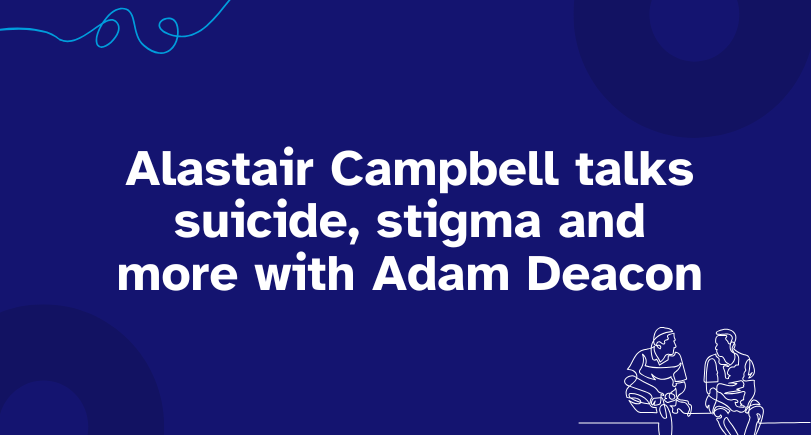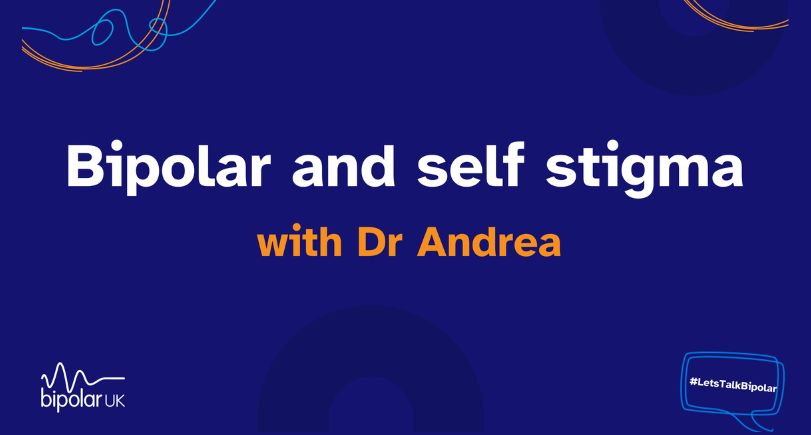
Bipolar and stigma
The stigma surrounding serious mental illness continues to have a worrying effect on the lives of people living with bipolar. While understanding of mental health has improved, Bipolar UK’s 2025 survey found that many people with the condition still face stigma in their daily lives.
What is stigma?
Stigma is the negative beliefs commonly held about a group of people because they’re different. Common beliefs about people with bipolar include that they’re dangerous, unreliable, overly emotional, and that they can’t live productive, meaningful lives.
Stigma can show up in different ways:
External stigma
This is how others see a bipolar diagnosis and respond to us, through stereotypes, discrimination or unkind/uninformed words.
Internal stigma (or self-stigma)
This is when we take those negative messages on board and turn them against ourselves, feeling ashamed or blaming ourselves for symptoms that are part of our illness.
Both forms of stigma can create barriers at work, in relationships and in getting support, making stability and recovery more difficult than they need to be.
Research shows stigma is one of the main reasons why people delay getting help for bipolar, which can directly make symptoms worse and harm recovery.

Watch Alastair Campbell and Adam Deacon chat about stigma, suicide and more
Self-stigma and bipolar
For many people living with bipolar, the most painful form of stigma is internalised. A Bipolar UK survey in 2025 found that 85% of respondents believe their experiences with stigma have caused them to think less about themselves and their abilities.
Feeling ashamed is often linked to certain bipolar symptoms, particularly:
- hypersexual, impulsive or paranoid behaviour
- psychosis
- mania
- suicidal thinking
Shame and self-stigma can sometimes be more harmful than the symptoms themselves, because they make people afraid to reach out for help.

Watch Dr Andrea discuss bipolar and self-stigma with the Rotary Bipolar eClub
Bipolar and stigma at work
The workplace is one of the most common areas where people with bipolar experience or worry about stigma.
Bipolar UK’s workplace survey found that nearly a quarter of respondents (24%) hadn’t told anyone at work about their diagnosis, and others reported regretting their decision to share, and some even faced discrimination.
Stigma at work can look like:
- being overlooked for opportunities or promotion
- negative assumptions
- lack of reasonable adjustments, despite legal protections under the Equality Act 2010
Four tips to manage workplace stigma
- Think carefully about who you share your diagnosis with and when.
- Share our 20-minute eLearning course to help managers and colleagues understand bipolar.
- Share resources with your HR team and line manager so they can support you at work, including signing up for Bipolar UK’s online workplace training.
- Know your rights under UK employment law and look into the government’s Access to Work scheme.
Bipolar and stigma in relationships
Relationships of all kinds can be deeply affected by stigma. A loved one, friend or colleague may not understand that certain behaviours are symptoms of bipolar and judge you – or they may make assumptions. For example, they may think symptoms of hypomania are signs you’re ‘fun’ and ‘spontaneous’, or ‘reckless’ and ‘irresponsible’, rather than realise you’re in an episode of serious illness.
Many people with bipolar tell us they often hide how they’re really feeling because they feel embarrassed, ashamed and fear being judged. For example, someone with bipolar may not tell a loved one they’re having suicidal thoughts, or that they’re finding it hard to sleep, which can both be warning signs of an episode.
If you’re finding that a lack of understanding or stigma is affecting your relationships, you’re not alone. Bipolar UK’s research found that:
more than a third of people with bipolar said stigma has impacted family relationships
nearly a quarter would only tell a new partner about their diagnosis once in a committed relationship
say bipolar stigma has affected their ability to make or keep friends
Four tips to manage stigma in relationships
- Talk to your loved ones as openly and honestly as you can about what having bipolar means for you and your life.
- Speak to your healthcare team about Family-Focused Therapy (FFT). FFT can help the family of someone living with bipolar learn more about the condition, including its causes, risks, symptoms and treatment.
- Invite your loved ones to attend our free monthly Family and Friends online support group.
- Encourage your loved ones to watch some of our videos to improve their understanding of the condition.
Managing bipolar stigma in society
You can protect your wellbeing and challenge negative attitudes about bipolar in practical ways. Remember that stigma usually comes from ignorance and a lack of awareness, rather than personal judgment.
1. Focus on what you can control
Connecting with people who understand, such as other people who are also affected by bipolar, can help to reduce feelings of shame or isolation. Why not join our Online Community to chat to others who really understand.
2. Use empowering self-talk
Remind yourself that your self-worth isn’t defined by approval from other people, but by your understanding of yourself. Using Cognitive Behavioural Therapy (CBT) techniques can sometimes break a pattern of unhelpful thinking to challenge stigma and self-stigma.
For example, if other people are judging your and/or you feel ashamed about spending so much money when you were hypomanic, you can start to see yourself through a more compassionate lens. Remind yourself that a symptom of your hypomania is impulsive spending, which is why you spent so much money.
3. Help people understand bipolar better
We know it can be tiring, but every conversation you have about bipolar raises awareness and helps to break down stigma.
4. Don’t let stigma stop you from seeking support for bipolar
Non-judgemental support is out there. With the right care, it’s possible to live well with bipolar.
If you’re worried about talking to a healthcare professional, or anyone in your life, about bipolar you can always contact Bipolar UK’s support services for a chat with someone who understands.
How Bipolar UK is tackling stigma
At Bipolar UK, we’re working to tackle stigma on two fronts: helping people with bipolar to treat themselves with more compassion, and increasing understanding of the condition among healthcare professionals, in the workplace and in wider society.
You can read more about Bipolar UK’s campaign work and what you can do to help us stop the stigma.
Bipolar and stress
Common questions about the link between stress and bipolar, and practical ways to manage stress.
Learn moreSuicide prevention
Suicidal thoughts are a common symptom of bipolar but there are lots of strategies to help manage them.
Get information and supportOther conditions
It’s common to have a ‘dual diagnosis’ and live with another condition alongside bipolar.
Learn more